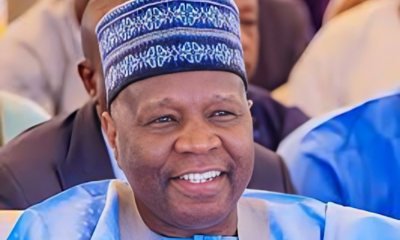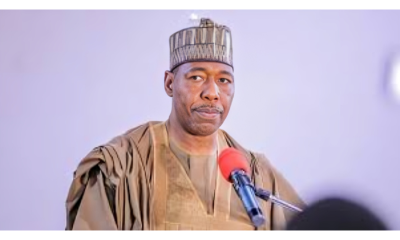NEWS
Lawyers Debate Marriage Dissolution Jurisdiction

Some Lagos-based lawyers have argued that dissolving a marriage that has broken down irretrievably is not the exclusive preserve of the high court.
They said this in separate interviews on Monday that whether a high court had jurisdiction to dissolve a marriage depended on the type of marriage contracted.
Mr Ogedi Ogu, Country Director of Advocacy for Justice and Accountability (AJA), said no law compels a spouse to remain in an abusive marriage.
Parties are free to seek separation.“For every toxic marriage, it is safer for the parties to live apart for their individual well-being.
“While only a court can dissolve a marriage contracted under the Act, the law does not require parties to cohabit until dissolution is granted.
“Desertion is a ground for dissolution if a spouse has left the marriage and they have lived apart for at least one or two years.
“However, even in a toxic marriage, only a high court can dissolve a statutory marriage,” he added.
Ogu also noted that customary marriages are dissolved by customary courts.
Mrs Ebere Obiora, Coordinator of the African Women Lawyers Association (AWLA), Ogun Chapter, said the Matrimonial Causes Act (MCA) grants the high court jurisdiction over marital disputes.
“However, an abused spouse should not have to remain in a toxic marriage while waiting for their divorce petition to be granted,” she argued.
“The final dissolution legally ends the marriage, but delays in divorce proceedings can pose a serious risk to an abused partner.
“This highlights the importance of judicial separation, which offers a legal alternative while the marriage remains valid,” she said.
Obiora explained that judicial separation prohibits physical contact but does not terminate the marriage.
She added that affected parties could still apply to the court for a full dissolution.
The Principal Partner of Ayoola Chambers, Mr Julius Ayoola, said that divorce procedures depend on the type of marriage involved.
He argued that dissolving a broken marriage is not necessarily the exclusive jurisdiction of the high court.
A statutory marriage, he explained, must be dissolved in a high court, while a customary marriage is handled by a customary court.
“A customary marriage can be dissolved in a customary court if the parties choose,” he said.
“In some cases, couples may avoid court altogether and dissolve the marriage by returning the bride price.
“In Igbo culture, a customary marriage is considered dissolved once the bride price is returned,” he added.
However, Ayoola noted that a high court might still intervene in matters concerning child custody and welfare.
“The high court has jurisdiction over the welfare of children,” he stated.
Senior Advocate of Nigeria (SAN), Prof. Samson Erugo, argued that couples do not need a high court ruling before separating.
“The requirement that only a high court can dissolve a marriage does not reflect reality and often causes undue hardship,” he said.
“In some places, couples can agree to separate through mediation or a dissolution agreement.
“Such an agreement can be filed in court and adopted without the stress of a full trial.
“I believe Nigeria should adopt this more flexible approach in clear cases of irretrievable breakdown,” he stated.
Erugo added that the high court requirement stems from Christian beliefs about marriage sanctity.
“This rule is a colonial legacy and has been embraced by local cultures seeking to protect marriage.
“While these arguments remain valid, modern realities should allow for exceptions,” he said. (NAN)
Foreign News
U.S Will Start Revoking Visas for Chinese Students

The United States says it will begin revoking visas of Chinese students and tighten screening for future applicants from China and Hong Kong, the US State Department said on Thursday.
“The U.S. will begin revoking visas of Chinese students, including those with connections to the Chinese Communist Party or studying in critical fields,” US Secretary of State Marco Rubio said on social media platform X.
In a press release, the State Department stated that it would also revise visa criteria to enhance scrutiny of all future visa applications from the People’s Republic of China and Hong Kong.
It was not immediately clear how many students currently in the United States would be affected or whether any exemptions would apply.
According to the Institute of International Education (IIE), about 277,000 Chinese students were enrolled at U.S. universities during the 2023-2024 academic years, making them the second-largest group of international students after those from India.
The U.S. already applies strict visa rules for Chinese nationals in certain academic disciplines, particularly in science and technology.
China’s Foreign Office said it filed a complaint against the unjustified step.
Washington’s discriminatory actions expose the lie of freedom and openness that the U.S. has always boasted about, said spokeswoman Mao Ning in Beijing.
The new measures come amid reports that the State Department has halted new visa interviews for international students and exchange visitors while it reviews screening procedures, including expanded checks on social media activity.
The pause reportedly affects F, M and J visa categories, including those for students, interns and au pairs, with further instructions expected in the coming days.
However, relations between Washington and Beijing have deteriorated further since U.S President Donald Trump took office in January.
The two economic powers are engaged in a deepening trade dispute and competing for global influence across multiple fronts.(dpa/NAN)
Education
How female Medicine Degree Holder Abandoned Certificate for Carpentry- Bugaje

The Executive Secretary, National Board for Technical Education (NBTE), Prof. Idris Bugaje has expressed the need to promote inclusivity, especially for women and persons with disabilities in technical education.
Bugaje stated this in Abuja while assessing the impact of President Bola Tinubu’s administration after two years in office.
He appealed for greater gender inclusivity in vocational and technical education, stressing that deliberate policies such as scholarships and incentives could help bridge the gender gap.
In support of his position, Bugaje shared an inspiring story of a female medical doctor who abandoned her medical career to pursue carpentry.
“There is a story I want to share with you, about a girl who was interested in becoming a carpenter.
“The father was a carpenter and they were four children in the family, three boys and herself.
“Whenever she joined the boys to the workshop, the father would send her away, saying, `you are a girl, go back to the house, you are not supposed to be a carpenter’’.
“Without giving considerations to the passion of the young girl, the father sent her to a medical school.
“She graduated with the MBBS, went and did the one-year internship after graduation, and chose a role as a medical doctor.
“After that, she came back to the father, returned the MBBS certificate to him, and thanked him.
“Afterward, she told the father that her passion is in carpentry, not to practice as medical doctor,” Bugaje narrated
He added that after spending seven years on medical training, the father had no option but to send her to Turkey to learn how to make furniture.
Addressing cultural and societal barriers often faced by young women in technical fields, Bugaje appealed to parents to support their daughters’ interests in trades like plumbing, electrical installation, and carpentry.
He also called on policymakers to prioritise passion and skill development among youth, especially girls, noting that such encouragement could lead to greater innovation and self-reliance.
“If they want to become carpenters, ICT experts, or POP artists, allow them.
“In skills’ training, passion is very important. That’s what motivates children and helps them innovate.
“We need to harness these innovations if the country is to move forward and rise beyond being a third-world nation,” he said.
He emphasized the need to have deliberate policies to encourage women to come into TVET through scholarships and other incentives. (NAN)
Education
WAEC Apologies for Conducting English Exam Late, Cites Leakage Prevention

The West African Examinations Council (WAEC) has apologized for delay in conducting English Language Paper 2 in the ongoing 2025 West African Senior School Certificate Examination (WASSCE).
The took place on Wednesday evening.
In a statement by Moyosola Adesina, Acting Head of Public Affairs Department of
WAEC, the council said that it encountered challenges.
”While maintaining the integrity and security of our examination, we faced considerable challenges primarily due to our major aim of preventing leakage of any paper.
“We recognise the importance of timely conduct of examinations and the impact of this decision on candidates, their schools and parents, and we sincerely apologise for any inconveniences caused,” WAEC stated.
It said that it successfully achieved its objective but it inadvertently impacted the timeliness and seamless conduct of the examination.
“In spite of our best efforts, we encountered logistical hurdles, security concerns and socio-cultural factors that negatively influenced our operations,” WAEC said.
The council re-affirmed its commitment to upholding the highest standard in examination conduct, and pledged to continue to promote academic excellence. (NAN)

















